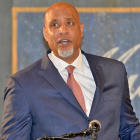In terms of shock value, there hasn't been a more surprising trade in recent years than Los Angeles Dodgers and Atlanta Braves. The Dodgers sent Adrian Gonzalez, Scott Kazmir, Brandon McCarthy, and Charlie Culberson to Atlanta for Matt Kemp. I thought it was a fake Twitter account when I first saw the deal.
For all intents and purposes, the Dodgers and Braves rearranged furniture with the trade. It is cash-neutral, but it helps the Dodgers get under the $197 million luxury tax threshold in 2018 and it clears payroll space for the Braves in 2019. The clubs did not make the trades for baseball reasons, per se. They did it to create more favorable payroll situations for themselves going forward.
The Dodgers-Braves trade was not the first payroll-motivated trade we've seen this offseason, and chances are it will not be the last. That should concern the MLB Players Association. Teams are having to reshuffle payroll to make moves rather than simply making moves, even though league revenues topped $10 billion in 2017 and all 30 clubs are getting a $50 million payday soon.
According to multiple sources all 30 MLB teams are expected to receive a payment of approximately $50 million dollars in the first quarter of 2018 for the previous sale of BAM. #MLB
— Jim Bowden🌟🎤 (@JimBowdenGM) December 15, 2017
Any time clubs are not spending, alarm bells should be going off at MLBPA headquarters. The league is flush with cash, and that cash is not yet going to the players. Just consider some of the moves we've seen this winter.
The NL MVP was salary dumped
Or, more precisely, the Miami Marlins were just sold for $1.2 billion and the owners have since traded away Marcell Ozuna, Dee Gordon, and reigning NL MVP Giancarlo Stanton in cost-cutting moves. Some combination of Christian Yelich, Martin Prado, Brad Ziegler, Junichi Tazawa, and Dan Straily figure to be traded at some point as well as the Marlins look to slash payroll and get their debt under control. Owners crying poor after shelling out $1.2 billion for the franchise is a bad look.
The Yankees and Dodgers are cutting payroll
The Dodgers made Saturday's trade because they want to get under the $197 million luxury tax threshold. The Yankees have made it no secret they will get under the threshold next season as well, which they project to do even after acquiring Stanton. They salary-dumped Chase Headley to make it happen. Consider each team's 2017 payroll, per Spotrac:
- Dodgers: $265.1 million
- Yankees: $224.5 million
Now both teams are aiming to get under $197 million next year. The Dodgers are cutting $68.1 million off their payroll and the Yankees are cutting $27.5 million off their payroll. That's $95.6 million -- $95.6 million! -- the game's two biggest spenders and two largest market teams are not spending on players next year.
Ohtani signed for peanuts
Because of the international hard cap rules, Shohei Ohtani's signing bonus was capped, and he was limited to a minor-league contract this offseason no matter where he signed. He wound up taking a $2.315 million bonus from the Los Angeles Angels, and will make the league minimum as a pre-arbitration player in 2018. The Angels control Ohtani for six years like any other rookie.
If not for the international spending rules, Ohtani would've received a nine-figure contract this winter and helped change the game's salary landscape, raising the bar for all MLBPA members. Instead, the hard cap is in place, and the dynamic young talent had to sign for relative peanuts.
The top free agents still aren't signing
Aside from Ohtani, who wasn't a true unrestricted free agent, it wasn't until Friday that one of our top 20 free agents signed. Carlos Santana (three years, $60 million) and Zack Cozart (three years, $38 million) signed with the Philadelphia Phillies and Angels on Friday, respectively, which will hopefully break the seal and lead to a rush of signings. I know I'm not the only one starved for hot stove activity.
Point is, it's now December 16, and only two of the top 20 free agents have signed. Why? Because it's a weak free agent class, yeah, but also because teams are waiting for bargains. There seems to be little urgency in free agency right now.
These are all trends that should worry the MLBPA. And, to be clear, the union has to look in the mirror and realize they helped create this problem. As part of the latest collective bargaining agreement negotiations, the MLBPA agreed to the new harsh luxury tax penalties that effectively act as a salary cap. That's why the Dodgers and Yankees are cutting payroll: to avoid those penalties. Also, the MLBPA agreed to the international hard cap that limited Ohtani's earning potential.
Prior to the 2015 season Nathaniel Grow of FanGraphs wrote a wonderful post detailing how the players are receiving an increasingly smaller piece of MLB's revenue pie. In 2002, the players received 56 percent of the league's revenues. In 2015, it was down to 38 percent. That combined with the offseason activity to date should worry the heck out of the union. Baseball is flush with cash, but teams around the league are scaling back on their spending and the players aren't getting their fair share, and the union deserves some of the blame for agreeing to the current luxury tax and international rules.


















